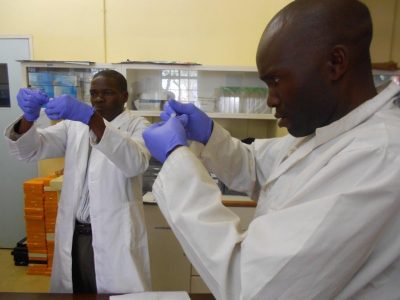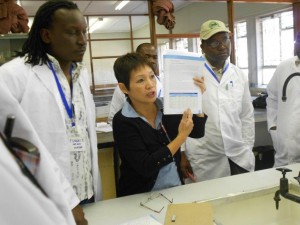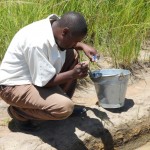The President’s Malaria Initiative (PMI) is working to further the capacity of the NMCP and other malaria partners to ensure they have the ability to collect and analyze insecticide resistance data and to use data to guide IRS programs.

Entomological technicians at the PMI workshop on insecticide resistance facilitated by CDC entomologists, Bill Brogdon and Adeline Chan.
In Zimbabwe, the government has been implementing IRS since the 1940s. Protecting 90% of the population from malaria through IRS is a core objective of the government’s 2008-2013 National Malaria Control Programme’s (NMCP) National Strategic Plan.
The President’s Malaria Initiative (PMI) is working to further the capacity of the NMCP and other malaria partners to ensure they have the ability to collect and analyze insecticide resistance data and to use data to guide IRS programs.
“The training was an eye opener on insecticide resistance techniques. The CDC bottle assays and other techniques from the training are easy to use, which will enable us to complete susceptibility and resistance testing locally,” said Caleb Marange, Insectary Manager for Burma Valley, Manicaland, Zimbabwe.
Entomologists from the U.S. Centers for Disease Control and Prevention, the AIRS Zimbabwe technical director/entomologist, and staff from the NIHR led trainings related to the following topics:
- Techniques to measure mosquito resistance to insecticides
- Molecular analysis to identify mosquitoes and insecticide resistance including:
- Classifying the species of mosquito and identifying insecticide resistance mechanisms in mosquito genes;
- Determining whether mosquitoes were infected with the malaria parasite;
- Establishing whether mosquitoes received their blood meal from humans
- Best practices in managing an insectary, a location for raising mosquitoes for insecticide resistance testing
Participants learned how to collect data and use the data to understand the effectiveness of an IRS program, specifically if mosquitoes are developing resistance to the insecticides being used for IRS and therefore making vector control ineffective. Program implementers can use this data to make informed decisions about which class of insecticide to use.
In addition to the training, PMI and AIRS Zimbabwe helped to refurbish a local insectary at the De Beers Laboratory so it could be used to breed a colony of mosquitoes for future insecticide resistance monitoring.
“With the skills our staff developed at the training, we can feel confident that IRS is protecting people from malaria,” Dr. Joseph Mberikunashe, National Malaria Control Programme Manager.
This story was taken from www.africairs.net


